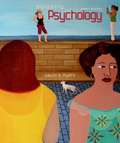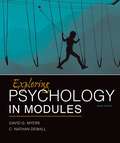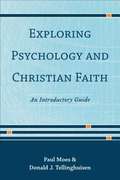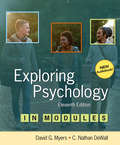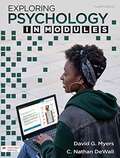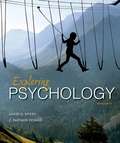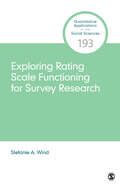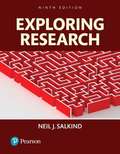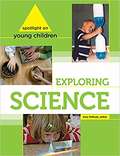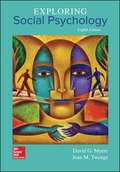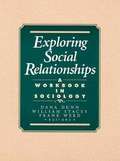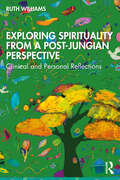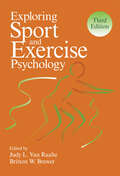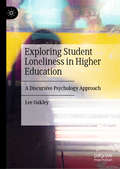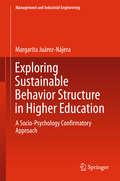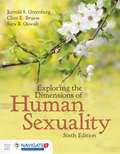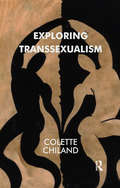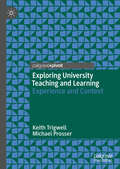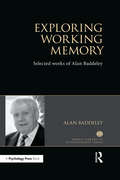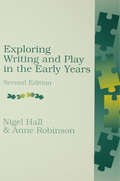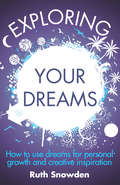- Table View
- List View
Exploring Psychology (8th edition)
by David G. MyersFar and away the bestselling brief introduction to psychology, David Myers' Exploring Psychology doesn't just present the story of the psychology. It involves students deeply in that story, as they learning to think critically about psychology's core ideas, breakthrough research findings, and wide-ranging applications to their lives and the world around them. The new Eighth Edition is both classic Myers and cutting-edge psychological science, a rich presentation more than ever before, helps students develop the critical thinking skills they need to make their encounters with psychological science successful and personally enriching. The most extensively revision to date, the Eighth Edition features many hundreds of new research citations, over 40% new photos, and state-of-the-art media and supplements--plus an all new critical thinking feature, Test for Success: Critical Thinking Exercises. Still, with the book's continual evolution, one constant remains: the inimitable writing of David Myers, who continues to show an uncanny ability to engage the curiosities of all kinds of students as they explore both the scientific and human aspects of the field of psychology.
Exploring Psychology In Modules
by David Myers C. DeWallThe new edition of Exploring Psychology in Modules offers outstanding currency on the research, practice, and teaching of psychology. Myers and DeWall inspire students with fascinating findings and applications, effective new study tools and technologies, and a compassionate and compelling storytelling voice.
Exploring Psychology and the Christian Faith: An Introductory Guide
by Paul Moes Donald J. TellinghuisenThis introductory guide provides a coherent framework for considering psychology from a Christian perspective.
Exploring Psychology in Modules
by David Myers C. DeWallAre you taking a psychology course, interested in self-study, or just plain curious about all things psychology? The best-selling Exploring Psychology text, newly available in this audiobook form and with an accompanying PDF of illustrations, teaches the concepts in an engaging, creative, effective way and helps us become better students and better people in the process. Exploring Psychology offers outstanding currency on the research, practice, and teaching of psychology. David Myers (Hope College) and Nathan DeWall (University of Kentucky) inspire their listeners with fascinating findings and applications and a compassionate and compelling storytelling voice that carries through beautifully in this audiobook's professional narration. Their presentation is based on the same guiding principles that have made David Myers the world's best-selling introductory psychology author. Myers and DeWall teach critical thinking and encourage active learning at every step; present psychology as a science, emphasizing the process of inquiry and putting facts in the service of concepts; and make sure their listeners come away with an appreciation of psychology's big ideas, and with a deeper respect for humanity - what drives us, distinguishes us, and unifies us.
Exploring Psychology in Modules
by David G. Myers C. Nathan DeWallDo you want your students to engage with and retain psychology’s key principles, and to work toward becoming better students and better people in the process? The modular version of Exploring Psychology offers creative ways to help make it happen. The new edition of Exploring Psychology in Modules offers outstanding currency on the research, practice, and teaching of psychology. Myers and DeWall inspire students with fascinating findings and applications, effective new study tools and technologies, and a compassionate and compelling storytelling voice.
Exploring Psychology in Modules
by David G. Myers C. Nathan DeWallExploring Psychology in Modules creatively helps students retain and appreciate psychology's big ideas, with insights that enable readers to be better students, more tuned-in friends and partners, more effective co-workers, and wiser parents. These best-selling authors aim to captivate students with what psychologists are learning about our human nature, to help them think more like psychological scientists, and to help them relate psychology to their own lives—their thoughts, feelings, and behaviors.
Exploring Psychology in Modules (Ninth Edition)
by David G. Myers C. Nathan DewallIn this ninth edition, the unwavering vision for Exploring Psychology is to merge rigorous science with a broad human perspective that engages both mind and heart.
Exploring Psychology, Tenth Edition
by David G. Myers C. Nathan DewallThe new edition of Exploring Psychology offers outstanding currency on the research, practice, and teaching of psychology. Myers and DeWall inspire students with fascinating findings and applications, effective new study tools and technologies, and a compassionate and compelling storytelling voice. Their presentation is based on the same guiding principles behind the entire family of textbooks that have made David Myers the world’s bestselling introductory psychology author: Facilitate learning by teaching critical thinking and helping students at every step. Present psychology as a science, emphasizing the process of inquiry and putting facts in the service of concepts. Make sure students come away with an appreciation of psychology’s big ideas, and with a deeper respect for humanity—what drives us, distinguishes us, unifies us. This Exploring Psychology is the first to include Myers’ handpicked co-author. Nathan DeWall shares Myers’ belief that instilling a sense of curiosity and inquiry about psychological science is an effective way to help students navigate the content, think critically, and prepare for a lifetime of learning and living. The extraordinary, longtime Myers ancillary author team is also here—a group whose teamwork, consistency, and commitment again sets the industry-standard for instructor and student supplements. The high quality that consistently sets Myers’ ancillaries apart sees a new incarnation in LaunchPad. This course space organizes all the book’s digital resources in an online format that makes it easier for instructors to teach, track, and assess their students
Exploring Rating Scale Functioning for Survey Research (Quantitative Applications in the Social Sciences)
by Stefanie A. WindItems with ordered response categories are common in survey research, such as when respondents are asked how much they agree with certain statements. But how large are the differences between categories of response, and how well do they distinguish between respondents? This volume is the first to introduce the evaluation of rating scales to an audience of survey researchers. Evaluating Rating Scale Functioning for Survey Research provides researchers with an overview of rating scale analysis along with practical guidance on how to conduct such analyses with their own survey data. Author Stefanie A. Wind presents three categories of methods: Rasch models; non-Rasch Item Response Theory (IRT) models; and non-parametric models, together with practical examples. Tutorials, datasets, and software code (R and Facets) to accompany the book are available on the book’s website.
Exploring Rating Scale Functioning for Survey Research (Quantitative Applications in the Social Sciences)
by Stefanie A. WindItems with ordered response categories are common in survey research, such as when respondents are asked how much they agree with certain statements. But how large are the differences between categories of response, and how well do they distinguish between respondents? This volume is the first to introduce the evaluation of rating scales to an audience of survey researchers. Evaluating Rating Scale Functioning for Survey Research provides researchers with an overview of rating scale analysis along with practical guidance on how to conduct such analyses with their own survey data. Author Stefanie A. Wind presents three categories of methods: Rasch models; non-Rasch Item Response Theory (IRT) models; and non-parametric models, together with practical examples. Tutorials, datasets, and software code (R and Facets) to accompany the book are available on the book’s website.
Exploring Research: Ninth Edition
by Neil J. SalkindFor courses in Experimental Methods and in Research Methods in Political Science and Sociology <P><P>An informative and unintimidating look at the basics of research in the social and behavioral sciences <P><P>Exploring Research makes research methods accessible for students – describing how to collect and analyze data, and providing thorough instruction on how to prepare and write a research proposal and manuscript. Author Neil Salkind covers the research process, problem selection, sampling and generalizability, and the measurement process. He also incorporates the most common types of research models used in the social and behavioral sciences, including qualitative methods. The Ninth Edition explores the use of electronic sources (the Internet) as a means to enhance research skills, includes discussions about scientific methods, and places a strong emphasis on ethics. <P><P>NOTE: This ISBN is for a Pearson Books a la Carte edition: a convenient, three-hole-punched, loose-leaf text. In addition to the flexibility offered by this format, Books a la Carte editions offer students great value, as they cost significantly less than a bound textbook.
Exploring Science (Spotlight On Young Children)
by Amy Shillady National Association for the Education of Young Children StaffChildren’s early SCIENCE experiences, at school and at home, are the foundation for future science learning and comprehension―throughout the school years and life. This collection of articles from NAEYC’s journal Young Children showcases exciting ways to support children’s science explorations from infancy through age 8. The authors offer ideas for science-rich environments and hands-on activities that promote young learners’ investigations and discovery. The articles describe teaching approaches and child-initiated projects that introduce children to scientific and engineering practices, and concepts in the physical, life, and earth and space sciences and in engineering and technology.
Exploring Social Psychology (Eighth Edition)
by David G. Myers Jean M. TwengeExploring Social Psychology succinctly explores social psychological science and applies it to contemporary issues and everyday life. Based on the bestselling text, Social Psychology by David Myers and Jean Twenge, the book presents 31 short modules―each readable in a single sitting―that introduce students to such scientific explorations as love and hate, conformity and independence, prejudice and helping, and persuasion and self-determination.
Exploring Social Relationships
by Dana S. Dunn Frank Weed William A. StaceyThis unique workbook involves readers in "hands-on" practice with applying sociological concepts as tools for understanding the social world around them - both social institutions and social processes. A series of essays and accompanying exercises actively engages readers in the study of human situations and social behavior by having them collect familiar information and analyze it using the sociological perspective. The essays address contemporary social issues and problems, and span a range of topics.
Exploring Spirituality from a Post-Jungian Perspective: Clinical and Personal Reflections
by Ruth WilliamsDerived from Ruth Williams’ more than 40-year immersion in spiritual practice, as well as her clinical experience as a Jungian analyst, this thought-provoking volume explores the nature of spiritual paths and trajectories in practical ways, incorporating personal anecdote and ground-breaking academic research and providing a window into how Jungian practitioners work with soul and spirit. Williams explores the nature of being a human using the Yiddish idea of a person being a ‘mensch’, which means being a decent human being, having humanity and living ethically with integrity. The idea of ‘grace’ is the thread that runs through the book—the mystery that binds things together and makes life meaningful, purposeful, potentially joyful and spiritually fulfilling. Williams sees ‘grace’ as being that which underpins and lies behind synchronicity and divinatory practices and as a force by which we can learn to be guided. Rooted in clinical work, Exploring Spirituality from a Post-Jungian Perspective is fascinating reading for Jungian analysts, therapists and academics, as well as for general readers interested in a spiritual journey, both personally and for clinical purposes.
Exploring Sport and Exercise Psychology
by Judy L. Van Raalte and Britton W. BrewerThis volume provides a comprehensive overview of the field of sport and exercise psychology, including common interventions for performance enhancement and health and well-being. The growing field of sport and exercise psychology offers an abundance of opportunities for clinical practice. For instance, a sport and exercise psychologist might work with elite or professional athletes, use exercise therapeutically with clients, conduct workshops for parents and youth sport coaches, or implement a community-based physical activity intervention. Recommendations are provided for assessing, treating, and referring clients with psychopathology, and considerations pertaining to special populations are also detailed, including work with youth sport participants, college student-athletes, elite athletes, and culturally diverse groups. The book concludes with a discussion of professional issues in sport and exercise psychology, including education, certification, how to integrate this specialty into existing clinical practice, and the unique ethical challenges of working in this area. With its comprehensive scope and emphasis on both research and application, this book is a rich resource for both practitioners and students interested in learning more about applying psychology in sport and exercise settings.
Exploring Student Loneliness in Higher Education: A Discursive Psychology Approach
by Lee OakleyThis book is an in-depth qualitative linguistic study of loneliness disclosures in interviews with undergraduate students in the UK. While much loneliness research has been undertaken in the areas of psychology, social policy and education, such studies have prioritised the social factors behind mental distress without paying explicit attention to the medium in which such distress is communicated and embodied (i.e. language). This monograph supplements this growing body of work by arguing for a stronger focus on the insights which linguistic analysis can provide for investigating how and why loneliness is disclosed by Higher Education students. This book is the first study to address discourses of loneliness in Higher Education specifically from a linguistic perspective, and will be of interest to education and healthcare professionals, counselling and welfare providers, and students and scholars of discourse analysis and linguistics.
Exploring Sustainable Behavior Structure in Higher Education
by Margarita Juárez-NájeraThis book presents a social-psychology model delineating the factors that may influence in an altruistic manner sustainable behaviour (SB) of students, faculty and administrators in four higher education institutions (HEI) with very different economic and social characteristics. It presents the areas where these individuals work (education and community management), and in which of them education for sustainability is promoted, focusing on four alternative methods of learning: play, art, group therapy, and personnel management. The book is intended for bachelors and graduated students, as well as researchers in social psychology, environmental psychology, conservation psychology, environmental education, education for sustainable development, cross-cultural psychology, and social sciences.
Exploring The Dimensions Of Human Sexuality
by Clint E. Bruess Jerrold S. Greenberg Sara B. OswaltFully revised and updated with the latest statistics and developments in the field, the Sixth Edition of Exploring the Dimensions of Human Sexuality presents all aspects of human sexuality and explores how it affects personality, development, and decision making. Using a student-friendly interpersonal approach, the text discusses contemporary concepts as well as controversial topics in a sensitive manner, and covers the physiological, biological, psychological, spiritual, and cultural dimensions of human sexuality. Exploring the Dimensions of Human Sexuality is an essential text for teaching sexuality and provides an integrated view of human sexuality that encourages students to pursue positive decisions, sexual health, and a lifetime of wellness.
Exploring Transsexualism
by Colette ChilandIs psychotherapeutic treatment powerless in the case of transsexualism? This intriguing volume by a French psychoanalyst with extensive experience of working with transsexuals is a useful addition to the debate on transsexualism and the definitions of sex and gender. Transsexuals feel that the opposite sex to their biological sex is their true identity - their true body and self. The idea of "hormonal and surgical sex reassignment" appeals to them; it would biologically put right what they already know to be right and true in their minds. The author discusses the problems of "reassigning" one's sex and argues that surgery alone cannot fix the situation.
Exploring University Teaching and Learning: Experience and Context
by Keith Trigwell Michael ProsserThis book focuses on university teachers’ experience of teaching and learning. Following on from the 1999 volume Understanding Learning and Teaching, which focused on student experiences of teaching and learning, this book provides guidance on how teachers’ experiences can be understood in ways which can support the continued enhancement of student learning experiences and learning outcomes. Drawing on the outcomes of a 30-year research project, this comprehensive volume discusses the qualitative variation in approaches to university teaching, the factors associated with that variation, and how different ways of teaching are related to differences in student experiences of teaching and learning. The authors extend the discussions of teaching into new areas, including emotions in teaching, leadership of teaching, growth as a university teacher and the contentious field of relations between teaching and research.“This important book offers an accessible, research-informed guide to understanding student learning and university teaching. Written by two world-leading experts in the field, it provides rich insights and practical responses to the challenges faced by those who care deeply about teaching and learning in higher education.” —Professor Paul Ashwin, Lancaster University, UK "Enhancing discipline-specific evidence-based development of the quality of teaching and learning in higher education has been my strategy during my whole career. Therefore and with great pleasure I read the book by Trigwell and Prosser which distills their teaching and learning research into a guide for those seeking to better understand their teaching environment. Building on their discovery of relations between the ways of teaching and the ways of learning, they expand on what is known about variation in teaching and how it links to course design, to research and to academic development. This book will be a valuable resource for many academics."—Professor Sari Lindblom, University of Helsinki, Finland “In an international higher education context going through much change and uncertainty, Trigwell and Prosser have produced a scholarly, timely, evidence-based, view of teaching and learning suitable for universities world-wide. The experience, quality and satisfaction of university leaders, researchers, teachers and students will benefit enormously from the ideas in this addition to their first book.”—Professor Robert A. Ellis, Griffith University, Australia
Exploring Working Memory: Selected works of Alan Baddeley (World Library of Psychologists)
by Alan BaddeleyIn the World Library of Psychologists series, international experts present themselves career-long collections of what they judge to be their finest pieces - extracts from books, key articles, salient research findings, and their major theoretical and practical contributions. Alan Baddeley has an international reputation as an eminent scholar and pioneer in the field of human memory, and is principally known for the theory of working memory, devised with Graham Hitch. This model continues to be valuable today in recognising the functions of short-term memory. This volume includes a specially written introduction by Alan Baddeley which gives an overview of the start of his career and his entry into the field of Psychology. Throughout the book he also provides introductions to the selection of works included and contextualises them in relation to changes in the field during this time. Exploring Working Memory includes the author’s most influential publications on topics including short-term memory, the distinctions between short and long-term memory, the theory of working memory, the phonological loop, the concept of the central executive, and the episodic buffer. This exceptional selection concludes with an article giving a broad overview of the author’s current views on working memory and its relation to other theories in the field. Through his outstanding work Alan Baddeley has become known as a world-leading expert on human memory. Exploring Working Memory is a unique collection which will be of great interest to both students and researchers interested in human memory from psychology backgrounds.
Exploring Writing and Play in the Early Years
by Anne Robinson Nigel HallThe second edition of this text shows how play and literacy can combine to help young children develop a more complete understanding of writing, as well as literacy more generally. In addition to discussing the implications of the new Guidance for the Foundation Stage, the authors use more recent research to extend the discussion of how and why pla
Exploring Your Dreams: How To Use Dreams For Personal Growth And Creative Inspiration
by Ruth SnowdenDreams are an integral part of who we are and carry valuable messages. They can reveal our true selves, unmasking our fears, hostilities, hidden talents and desires. Enabling us to explore and learn from hidden aspects of the psyche, dreams can teach you a lot about yourself and others, helping you with problems and guiding you throughout your life. This book gives advice and guidance on exploring and interpreting your dreams, and using them for personal and creative development. It includes: * The place of dreams in human culture. * How to prepare for, and how to record your dreams. * Dream analysis, including common dream types and the strange but powerful world of symbolism. * Advanced dream exploration, including joining a dream group and working with others.
Exploring Your Dreams: How to use dreams for personal growth and creative inspiration
by Ruth SnowdenUse this dream handbook to decode hidden aspects of your psyche, as well as to inspire you to grow and achieve personal goalsDreams are an integral part of who we are and carry valuable messages. They can reveal our true selves, unmasking our fears, hostilities, hidden talents and desires. Enabling us to explore and learn from hidden aspects of the psyche, dreams can teach you a lot about yourself and others, helping you with problems and guiding you throughout your life. This book gives advice and guidance on exploring and interpreting your dreams, and using them for personal and creative development. It includes:* The place of dreams in human culture. * How to prepare for, and how to record your dreams. * Dream analysis, including common dream types and the strange but powerful world of symbolism. * Advanced dream exploration, including joining a dream group and working with others.
